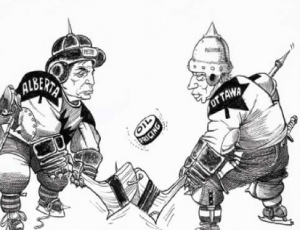To What Extent Should Nation be the Foundation of Identity?
Source 1 –

Souce 2 –

Source 3 –
“We need to be loyal to one country as far as your citizenship. Your heart can be where you were born, but the commitment to Canada has to be strong and I think dual citizenship weakens that.”
Source 1 – Split between the Canadian maple leaf and Quebecois fleurs-de-lis.
Instantly upon analysis of the source, one can see that it is a split symbol of a red Maple Leaf, as seen on the federal Canadian flag, and the blue fleurs-de-lis as would be seen on the Quebec provincial flag. The source literally shows a division between not only Quebecois versus federal Canadian symbolism but also brings forth the notably conflicting identities of Quebec and the rest of Canada. The source certainly speaks to the centuries of the somewhat existential crisis among those in the Quebecois demographic. The source speaks to the divisive history of Canada; the struggle between the contending nationalist loyalties of Canadian federalists and Quebec sovereigntists. The source relates back to nationalism significantly; namely ethnic, linguistic, cultural nationalism, and these corresponding loyalties. The source directly references the stark contrast in ideology and nationalistic practice between the Quebecois and mother country. While Canadian citizens would certainly like to see themselves as a perfectly united federation that gets along all fine and dandy despite our differences, this notion really is not what it chuckles itself up to be. As such, however, people will often realize that, yes, we are a civilized populace, but we do have conflicting loyalties, identities, languages, and ideas that have led to divisive policy and violence in our past.
Source 2 – Trudeau v Lougheed for oil pricing.
Again, this source jumps out as one that obviously uses not only the stereotypical game of hockey to represent competition, but also the clever use of labeling to convey that there’s more to this illustration than a mean-eyed faceoff. The source is speaking to the fiasco surrounding the NEP, production & pricing of Alberta oil, and the adverse loyalties between former PM Pierre Trudeau and former Alberta Premier Peter Lougheed. The big conflict of interests began with the founding of the National Energy Policy by Pierre Trudeau’s federal government; a policy designed to protect Canadians from rising international oil & gas prices by making a push towards making Canada a country self-sufficient in regards to its energy needs. However, this ended up doing more harm for Alberta than good for much elsewhere. The policy was made with little consultation from the Albertan government, and as such, angered the general public. With the founding of this policy, one can understand where Trudeau was coming from with his loyalty to Canada as a whole and wanting his country to be better off. One can equally sympathize with Lougheed feeling backstabbed, as the government one would promise unwavering loyalty to rewarding this with essentially exploiting you. Feels pretty bad. This stark contrast in practices would stem from their contending loyalties of that from a specific geographical region to the loyalties of one meant to serve the whole country. To put it another way, it was a contrast between serving Canada and serving Alberta. Competing loyalties between regional and national, as well as economic and internationally related matters, are eventually what made this policy flop.
Source 3 – Quotation about dual citizenship
The third source is a quotation that speaks in regards to dual citizenship, and how this relates to regional or national loyalties. The source does seem, however, to border on favouring the loyalty to Canada as superior to the loyalty to any other. While this seems rooted in logic, the source really tries to make a statement against having any loyalty to contend with Canada; makes a statement, indirectly, that being Canadian is automatically superior to the nationality of any other country. There is a slight problem with this of course, in that it borders on extremism, and discourages diverse national identity. This discouragement of multinational identity is what one would see popularized among figures like Stalin or Hitler, or in the infamous residential school system of Canadian history. The source would also appear to be misguided, as one could infer that from multiple national identities among being Canadian, would not this only affirm Canada’s reputation for being pluralistic; affirm our own national identity by accepting those of others? Furthermore, the phrase “commitment to Canada” is rather vague, and further makes it obvious the ignorant nature and misguidance of this source. Based on the topic, though, this demanding ideal of committing all of your loyalties to just Canada borders on assimilation. So, yes, while the source has the intention of wanting one’s nationalist loyalties ground in Canada, it really would serve only to falter our own national identity if adapted on a large scale.
To what extent should nation be the foundation of identity?
All three of the above sources speak to the concept of nationalism, especially different types of it, and how this broad blanket term applies to our ways of life and identities as Canadians. Sources 1 and 2 most distinctly speak to nationalist loyalties competing with other loyalties; namely those to a specific region or ethnic identity. The first and third sources are similar in that source three would support the division and alienation of some identities as seen with the push for separatism in Quebec throughout history. Similarly, the third source would also stand against the motives of Peter Lougheed, and stand in favour of loyalties towards Canada as a whole. Sources 2 and 3 both seem to insist a resolution is needed to the apparent problem of loyalties that contend with Canadian nationalism; bethem regional or multinational.
To answer the question though, nation should be the foundation of one’s identity proportional to the pride and loyalty one has to their nation. Logically, people won’t choose to have their nation as a significant contributor to their individual identity if they have no passion or mindset geared to the set country. From source 1, if one’s nation is that of the Francophone population of Quebec, then striving to keep Quebecois culture and language alive would likely take precedence; leaving a large part of one’s foundational identity as nation. Similarly, if one such as Peter Lougheed identifies with a nation of sorts in the people of Alberta, then his identity and life choices will reflect as such.